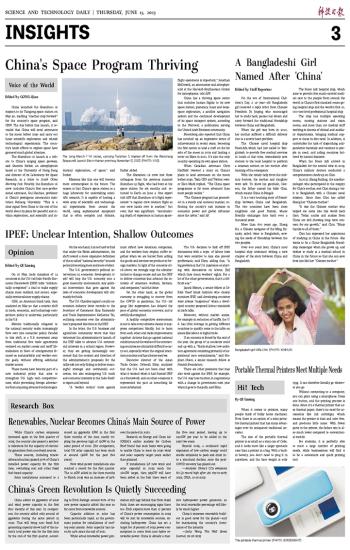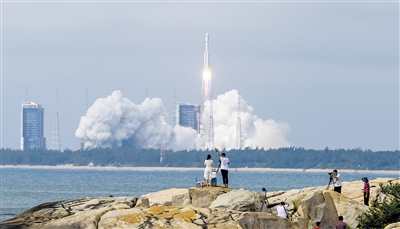
 |
| The Long March-7 Y6 rocket, carrying Tianzhou-5, blasted off from the Wenchang Spacecraft Launch Site in Hainan province, November 12, 2022. (PHOTO: VCG) |
China launched the Shenzhou-16 mission to its Tiangong space station on May 30, marking "another step forward" for the country's space program, said CNN. The day before this launch, it revealed that China will send astronauts to the moon before 2030 and carry out lunar scientific exploration and related technological experiments. The country's latest efforts to explore space have garnered much global attention.
The Shenzhou-16 launch is a tribute to China's surging space prowess, said Quentin Parker, an astrophysicist based at the University of Hong Kong and director of its Laboratory for Space Research, in a letter to South China Morning Post. Notably, the Shenzhou-16 crew includes China's first non-professional astronaut, Gui Haichao, professor at China's prestigious aeronautics institution Beihang University. "This is a clear signal from China to the rest of the world about its plans for peaceful and civilian exploration, and scientific and industrial exploitation, of space," said Parker.
Missions like this one will become more commonplace in the future. The reason is that China's space station is a huge laboratory for undertaking scientific research. It is capable of hosting a wide array of scientific and technological experiments from around the world, using sophisticated equipment that is often complex and delicate, Parker added.
The Shenzhou-16 crew met three colleagues from the previous manned Shenzhou-15 flight, who had been at the space station for six months and returned to Earth on June 4. One expert told AFP that Shenzhou-16's flight represented "a regular crew rotation flight as one crew hands over to another," but even that was significant. "Accumulating depth of experience in human spaceflight operations is important," Jonathan McDowell, an astronomer and astrophysicist at the Harvard-Smithsonian Center for Astrophysics, told AFP.
China has a thriving space sector that includes human flights to its new space station, planetary, lunar and deep-space exploration, a satellite navigation system and the continued development of its space transport system, according to the National, a publication serving the United Arab Emirates community.
Bloomberg also reported that China has notched up an impressive series of achievements in recent years, becoming the first nation to land a craft on the far side of the moon in 2019 and landing a rover on Mars in 2021. It's also the only country operating its own space station.
When Canadian astronaut Chris Hadfield tweeted a story on China's plans to land astronauts on the moon before 2030, Tesla CEO and Twitter owner Elon Musk replied, "The China space programme is far more advanced than most people realize."
"The Chinese program has proceeded in a steady and cautious manner, reflecting the county's vast increase in economic power and global influence since the 1980s," said AP.


 Next
Next




